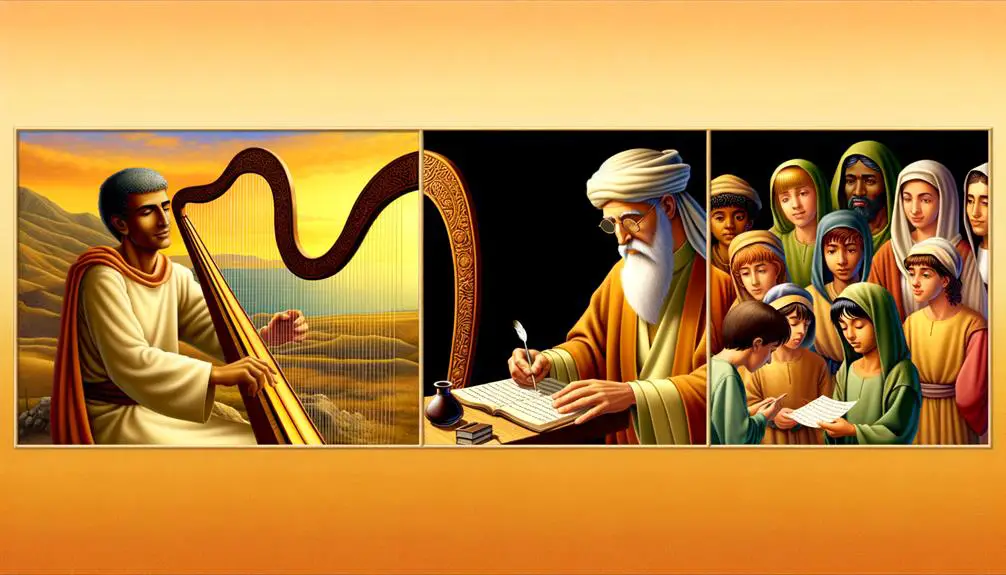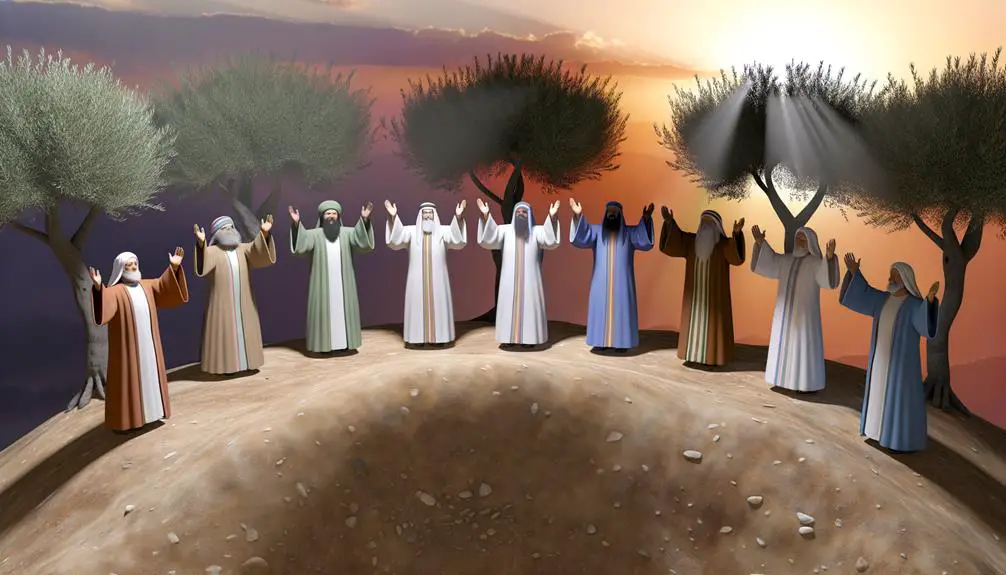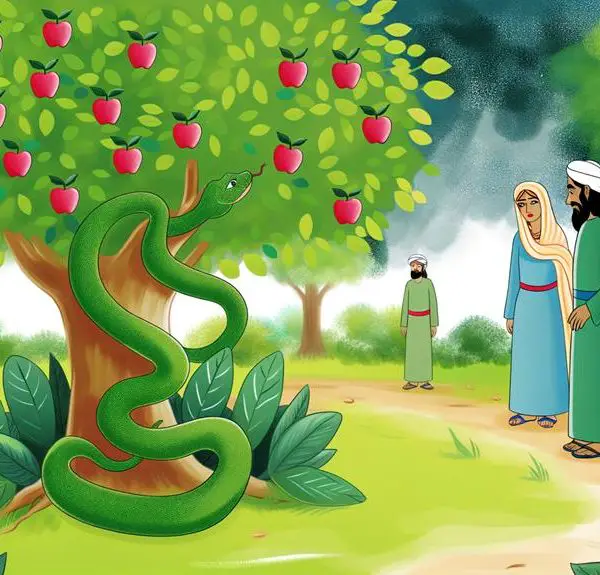Discover Biblical praise through David's psalms and Mary's Magnificat, exploring deep emotions and divine narratives that beckon further reflection.

Examples of Praise in the Bible
In the Bible, you'll encounter myriad forms of praise, each reflecting unique theological insights and spiritual practices. The Psalms, for instance, encapsulate a range of human emotions, offering a means to engage in a simultaneously personal and communal dialogue with the divine. You'll find emotional depth in David's Thanksgiving psalms, which highlight profound gratitude towards God. Additionally, Mary's Magnificat praises God's might and mercy, framing it within a context of social reversal and divine favor. Understanding these examples provides a deeper appreciation of the Bible's multifaceted nature of worship and praise. Exploring further could reveal additional layers of spiritual and theological depth.
Key Takeaways
- Psalms often express praise, using musical instruments and rich lyrics to celebrate God's greatness and mercy.
- David's Thanksgiving psalms reflect gratitude and acknowledgment of God's providential care.
- Mary's Magnificat praises God for His might, mercy, and the uplifting of the humble.
- The Prophets, including Isaiah, offer exultant praise envisioning a hopeful, restored future under God's guidance.
- In Revelation, heavenly beings and all of creation worship God, highlighting His supreme sovereignty and eternal dominion.
Praise in the Psalms

Many of the Psalms are steeped in expressions of praise, revealing a profound theological perspective on the nature of worship. You'll find that the Psalms, as a collection, are not just poems; they're intricately composed pieces that serve dual roles as theological texts and liturgical songs. Their structure and content reflect a deep engagement with both musical worship and lyrical adoration.
When you explore the Psalms, you notice that they often employ a rich variety of musical instruments, suggesting that the ancient Israelites saw musical worship as an essential component of their religious practice. Instruments like the harp, lyre, and cymbals aren't just mentioned as accompaniments but are integral to the worship experience, enhancing the communal and emotional depth of the praise.
Moreover, the lyrical content of the Psalms is equally significant. You'll see that they encapsulate a range of human emotions, from deep despair to exuberant joy, which are all directed towards God. This lyrical adoration is not merely about expressing feelings but about constructing a narrative that invites reflection on the divine nature and human relationship with God. Through these narratives, the Psalms facilitate a personal yet communal dialogue with the divine, embodying a form of worship that is both introspective and collective.
Mary's Magnificat
While the Psalms provide a broad canvas of communal worship, Mary's Magnificat offers a deeply personal instance of biblical praise, reflecting an individual's spiritual revelation and prophetic gratitude. You'll find that the Magnificat context is steeped in profound humility and a recognition of social and spiritual reversal. Let's explore further into the layers of Mary's expression and what it signifies in the broader biblical narrative.
- Historical Setting: The Magnificat, found in Luke 1:46-55, occurs right after Mary learns of her role in the birth of Jesus, imbuing her song with anticipatory joy and a sense of mission.
- Theological Themes: It emphasizes God's might, holiness, and mercy, particularly highlighting divine intervention in overturning societal norms.
- Reflection of Mary's Humility: Mary acknowledges her lowly state and God's favor in choosing her, a theme that resonates with her acknowledgment of God's preference for the humble and disenfranchised.
- Prophetic Undertones: Mary predicts how future generations will perceive this divine act, suggesting a reversal of fortunes for the rich and powerful versus the poor and meek.
- Literary Style: The Magnificat mirrors the poetic and rhythmic qualities of Old Testament songs, suggesting continuity with Jewish prayer traditions.
This analysis reveals how Mary's personal praise moment transcends to a universal message on divine justice and humility.
David's Thanksgiving

As you explore David's Thanksgiving in the biblical context, it's important to examine his psalm compositions, which stand as profound acts of gratitude towards God. These texts not only reflect his personal devotion but also underscore a communal call to praise, integrating personal experience with a broader theological framework. Analyzing these compositions reveals how David's gratitude transcends mere personal relief and encompasses a recognition of divine sovereignty and mercy.
David's Psalm Compositions
David's psalms, numbering over seventy, stand as a profound expression of his devout thanksgiving and worship within the biblical text. Each composition reveals not just his deep spiritual insights but also his skilled use of musical instruments and the rich tapestry of emotional expression that defines his praises. These psalms serve multiple purposes:
- Emotional Catharsis: Providing an outlet for a range of feelings, from despair to exultation.
- Musical Innovation: Incorporating various instruments, enhancing the worship experience.
- Theological Reflection: Offering deep insights into the nature of God and man's relationship with Him.
- Communal Singing: Uniting the community in worship and shared spiritual experience.
- Historical Record: Preserving the spiritual and cultural milieu of his time.
Gratitude to God
In examining the numerous instances of thanksgiving in David's life, it's evident that his gratitude towards God not only shaped his personal spirituality but also set a precedent for worship in the biblical tradition. Your exploration of David's divine appreciation reveals a pattern of thankful living that transcends mere ritual, embedding a heartfelt acknowledgment of God's providence in every aspect of his reign and personal challenges. This spiritual posture fostered an environment where praise and gratitude were integral, influencing both his psalms and his governance. Analyzing these expressions, you'll notice how they not only reflect his immediate responses to God's deliverance but also illustrate a broader theological understanding of continuous, unwavering dependence on divine favor and guidance.
Songs of Solomon
The Songs of Solomon, often referred to as the Song of Songs, represent a unique lyrical tapestry within the biblical canon, showcasing an intricate blend of romantic imagery and spiritual allegory. As you explore its verses, you'll encounter a profound depth of emotion and theological richness that may surprise you. This book is a love allegory, where the passionate exchanges between lovers symbolize the relationship between God and His people, offering a profound understanding in a poetic form.
Here are some aspects to ponder:
- Symbolic Language: The text uses lush, vivid descriptions of nature and the human body to convey spiritual truths.
- Literary Structure: The Song of Songs features a dialogue form, enhancing its dramatic and poetic quality.
- Universal Themes: It touches on universal themes of desire, longing, and fulfillment, both human and divine.
- Historical Context: Understanding the historical and cultural backdrop can enrich your interpretation of its messages.
- Theological Implications: The Songs challenge and inspire theological reflections on the nature of love and commitment.
Engaging with the Songs of Solomon requires an appreciation for its poetic imagery and allegorical nuances, making it a uniquely enriching part of biblical praise literature.
Prophets' Exultations

Prophets' explorations in the Bible often serve as profound declarations, revealing God's intentions and guidance through their impassioned praises and prayers. When you investigate the stories of these prophets, you witness not only their divine missions but also their personal moments of spiritual celebration. Elijah's joy, for example, is palpable when he triumphs over the prophets of Baal on Mount Carmel. This joy isn't merely about victory; it's a deep, resonant praise for the vindication of his faith in God's supreme power. His ecstatic prayer afterward transcends simple thanksgiving and enters a domain of profound worship, underscoring his intimate relationship with the Divine.
Similarly, Isaiah's songs offer a rich tapestry of prophetic praise. His writings are not just prophetic warnings but are imbued with lyrical adulations that envision a future filled with hope and restoration. Isaiah's ability to interweave his admonitions with exultant praise illustrates a multifaceted approach to prophetic communication—one that balances forewarning with fervent glorification of God. His songs serve as a model for you to understand how praise can coexist with prophecy, providing a dual function of enlightenment and worship.
Paul's Letters of Praise
As you explore Paul's epistles, you'll notice his strategic use of praise to foster church unity and commend individual believers for their service. His letters often highlight the crucial role of communal harmony in the early Christian communities, emphasizing how individual contributions strengthen the collective faith. This method not only motivates his audience but also reinforces the theological underpinnings of Christian service and unity.
Encouraging Church Unity
Often, Paul's letters commend various congregations for their unity, urging them to maintain this harmony as a proof of their faith. You'll find that his epistles intricately weave the principles of harmonious fellowship and peaceful collaboration, setting a precedent for how church members should interact.
- Ephesians 4:3 – emphasizes the importance of maintaining the unity of the Spirit through the bond of peace.
- 1 Corinthians 1:10 – calls for no divisions among you, but that you be united in the same mind and judgment.
- Philippians 2:2 – urges fulfilling joy by being of the same mind, having the same love, and being in full accord.
- Romans 15:5-6 – highlights God giving endurance and encouragement to live in harmony.
- Colossians 3:14 – advises that above all, love binds everything together in perfect harmony.
Commending Faithful Service
In his epistles, Paul frequently commends individuals for their steadfast service and dedication, highlighting how such virtues sustain the vitality of the church community. This servant recognition acts as a profound form of rewarding loyalty, emphasizing the critical role of faithfulness in the spiritual ecosystem.
Person |
Virtue Highlighted |
Emotional Impact |
|---|---|---|
Phoebe |
Assistance |
Inspires generosity |
Timothy |
Diligence |
Motivates perseverance |
Epaphroditus |
Sacrifice |
Cultivates resilience |
Priscilla and Aquila |
Bravery |
Encourages courage |
Each example not only commends the individual but also serves as an emotional and motivational beacon to others, reinforcing the interconnectedness and collective strength of the church body. Through these letters, you're invited to reflect on the power of acknowledgment and its ripple effects within your own community.
Worship in Revelation

The Book of Revelation vividly depicts worship as a central theme, portraying celestial beings and humanity united in adoration of God. In this profound narrative, you'll find the heavenly chorus and angelic worship play pivotal roles, underscoring the cosmic scale of divine reverence. These elements are not merely decorative; they provide critical insights into the theology of worship in Christian eschatology.
Consider these significant aspects of worship in Revelation:
- Multitude of Angels: An innumerable host of angels encircle the throne, singing praises, which reflects a hierarchy of angelic beings dedicated to ceaseless worship.
- The Lamb and the Seals: Worship intensifies as the Lamb opens the seals, indicating that worship is deeply intertwined with the unfolding events of the end times.
- Elders and Living Creatures: The twenty-four elders and four living creatures fall down before the throne, signifying endless devotion and the acknowledgment of divine sovereignty.
- New Song: The new song sung by the redeemed is a key element, symbolizing renewal and the unique response of the saved to God's salvation.
- Universal Worship: Every creature in heaven and on earth joins in the worship, emphasizing the universal scope of God's dominion and the eschatological gathering of all creation in praise.
Through these depictions, Revelation portrays worship as a dynamic, participatory, and all-encompassing act of devotion.
Frequently Asked Questions
How Does Praise Impact Mental Health According to the Bible?
Praise benefits your mental health by offering spiritual upliftment, as suggested in biblical texts. This spiritual enhancement can lead to improved well-being, reducing stress and fostering a deeper sense of peace and contentment.
Are There Examples of Silent Praise in the Bible?
You'll find that silent gratitude and unspoken worship, while not explicitly detailed, are implied through reflective, personal interactions with God, suggesting a more introspective form of praise beyond vocal expressions in biblical narratives.
What Role Does Dance Play in Biblical Praise?
In exploring dance's role, you'll find it embodies choreographic worship and symbolism, deeply enhancing spiritual expressions through rhythmic movement, often aligning participants with shared divine experiences and intensifying communal involvement in sacred acts.
How Is Praise Used in Times of Personal Crisis?
In your darkest hours, praise acts as a beacon, summoning divine intervention. It's not merely emotional relief; it's a strategic tool for crisis resolution, deeply analyzed through its psychological and spiritual impacts.
Can Praise Influence Community Relationships in Biblical Contexts?
In biblical contexts, your use of praise can greatly enhance community cohesion and spiritual unity. This shared expression fosters a collective identity and strength, deepening bonds and resilience among community members.



Sign up